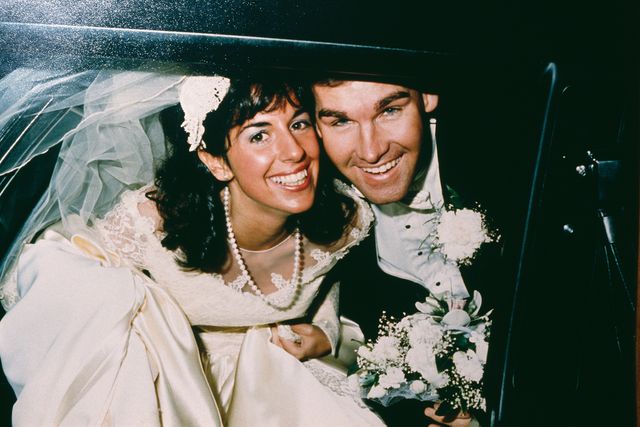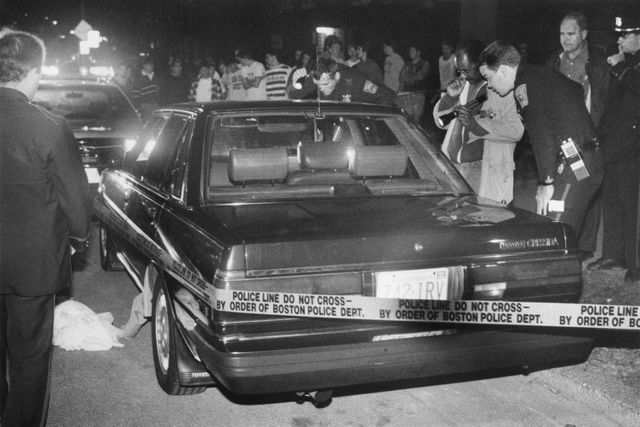HBO’s true-crime docuseries chronicles the case of Charles Stuart, who killed his wife and blamed it on a Black man.
Thirty-four years ago, Charles “Chuck” Stuart called 911 saying he and his pregnant wife, Carol, had been shot in their car and left for dead on a dark, deserted street in Boston. Cameras for the CBS docudrama Rescue 911 just happened to be shadowing Boston’s EMS teams that night, and in the opening minutes of HBO’s new true crime documentary Murder in Boston, we see footage of Chuck Stuart being loaded into an ambulance.
“You see who did this?” a police officer asks him. Though he’s suffering from a gunshot wound to the abdomen, Stuart’s answer is clear: “A Black man… Black male.”
That’s pretty much where the questions for Chuck Stuart stopped. Rather than drilling down on his vague story, the Boston Police Department launched an aggressive manhunt in the city’s predominantly Black neighborhoods of Mission Hill and Roxbury — terrorizing a community and exacerbating Boston’s roiling racial tensions. (Chuck’s brother Matthew later confessed to police that Chuck killed Carol, possibly for the insurance money.) Directed by Jason Hehir (The Last Dance), Murder in Boston: Roots, Rampage & Reckoning gives voice to the people who were unjustly victimized by law enforcement and examines the legacy of that painful rush to judgment.

Ira Wyman/Sygma via Getty Images Carol and Charles Stuart on the day of their wedding, October 13, 1985.
Carol Stuart died on October 24, 1989, one day after Chuck’s 911 call. (Her son, Christopher, who was delivered by emergency C-section, lived only 17 days.) The media — as it did with the Central Park Jogger case six months earlier — accepted the police’s version of events, and the story quickly vaulted into the national headlines. Through archival news footage and interviews with locals, Murder in Boston recounts the indiscriminate police raids that followed through the perspective of the Black residents who endured them. “It was open season on Black people,” says Ron Bell, who grew up in Mission Hill. Adds author and Boston native Dart Adams, “When crimes happen in certain parts of Boston, we all fit the description.”
In the first of its three episodes, Murder pulls back to explore how Boston’s history of turbulent race relations — specifically the 1974 school desegregation ruling — revealed a city that was just one inciting incident away from an explosion of violent animus. Hehir assembles an array of powerful archival footage featuring the brutal protests against “forced busing” and news interviews with white Bostonians whose blatant, confident racism is truly shocking, even for the 1970s. Interviews with students who lived through the riots, as well as lawyer and activist Ted Landsmark — who was famously beaten by a white student holding an American flag during an anti-busing protest — provide a vivid illustration of the fear and dread that was still so fresh for Black Bostonians in 1989.

Tom Herde/The Boston Globe via Getty Images Police investigate Charles Stuart’s car at the shooting scene on St. Alphonsus Street in Mission Hill on October 23, 1989.
The arrests began less than a week after Carol’s death. First came Alan Swanson, a homeless man who happened to own a sweatsuit like the one Chuck said his assailant was wearing. Swanson was never charged, but he was only released after the police brought in a second suspect, Willie Bennett — a Mission Hill resident who fell victim to what one observer calls “a game of telephone in the projects.” In the series’ most agonizing episode, Bennett’s nephew, Joey, and his childhood friend Dereck Jackson recall how a casual night at home drinking and “running our mouths” about the Stuart case resulted in Willie’s arrest for the city’s most high-profile murders in years. Hehir films Jackson listening to audio of his 17-year-old self being interrogated by police, who he says coerced him into implicating Willie Bennett. Later we see Joey Bennett wiping away tears as he watches archival footage of Willie’s mother, Pauline, giving an interview to local news after police trashed her apartment looking for clues. It’s a powerful reminder of how hard it is for trauma like this to heal — if it heals at all. (Willie Bennett was never officially charged. In 1993, he sued the BPD for violating his civil rights, but the case was dismissed.)
A disclaimer at the end of Murder in Boston says only one police official who was “directly involved in the Stuart case” agreed to be interviewed for the documentary. Unfortunately for the Boston Police Department, that officer, retired detective Bill Dunn, seems to hold the same attitudes about policing in Mission Hill — and the Stuart case itself — as he did when arresting Alan Swanson more than 30 years ago. “I don’t regret the way I operated,” Dunn says. Pointing to his heart, he adds, “Everything I did, I did from here.” It’s unclear whether Hehir and his team attempted to interview any Boston Police officials not directly involved in the Stuart case — including Michael Cox, currently the city’s second Black police commissioner — who could have offered important insight about the legacy of the Department’s failings in 1989 and what changes, if any, were made as a result. Without this context, Murder can only add to the multiple unanswered questions about the BPD’s blatantly botched investigation.
What the series does make clear, though, is how the damage wrought by the Stuart case continues to endure decades later. “My life’s been f—ed up ever since then,” says Willie Bennett, speaking in a recent audio interview conducted by his daughter Aisha. “I’m still angry.” Hehir’s series will leave viewers feeling the same way. Grade: B
Murder in Boston: Roots, Rampage & Reckoning premieres Monday, Dec. 4, at 9 p.m. ET/PT on HBO.
Sign up for Entertainment Weekly’s free daily newsletter to get breaking TV news, exclusive first looks, recaps, reviews, interviews with your favorite stars, and more.
Read the original article on Entertainment Weekly.
News Related-
AWS and Clarity AI to use generative AI to boost sustainable investments
-
Ref Watch: 'Enough' of a foul to disallow Man City goal vs Liverpool
-
Day in the Life: Ex-England rugby star on organising this year's Emirates Dubai Sevens
-
Pandya returns to MI, Green goes to RCB
-
Snowstorm kills eight in Ukraine and Moldova, hundreds of towns lose power
-
‘This is why fewer Sikhs visiting gurdwaras abroad’: BJP after Indian envoy heckled in Long Island
-
Inside a Dubai home with upcycled furniture and zero waste
-
Captain Turner aims for Pitch 1 return as JESS bid to retain Dubai Sevens U19 crown
-
No Antoine Dupont but Dubai still set to launch new era for sevens
-
Why ESG investors are concerned about AI
-
Your campsite can harm the environment
-
Mubadala, Saudi Fund deals on US radar for potential China angle
-
Abu Dhabi T10 season seven to kick off with thrilling double-header
-
Eight climate fiction, or cli-fi, books to consider before Cop28
